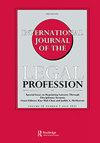Being a woman judge in Turkish judicial culture
IF 0.9
Q2 LAW
International Journal of the Legal Profession
Pub Date : 2020-05-03
DOI:10.1080/09695958.2019.1667807
引用次数: 2
Abstract
ABSTRACT This study is a feminist exploration of how gender influences the professional and social lives of women judges in Turkey. I asked women judges from lower courts to talk about their professional journey to explore if and how gender emerges as a category that makes sense to them. Gender was sometimes more visible in the form of a “success” story of playing along men’s rules, or in memories of struggling to balance work and family; while other times it was more implicit in narratives on meeting expectations, failing expectations, ignoring expectations. All in all, these narratives attest to the gendered hierarchies and instances of institutional sexism in what is considered a masculine profession. They also reveal the prevalence of a particularly conservative and patriarchal culture upon the ways in which these inequalities and disadvantages are experienced by women judges in Turkey.土耳其司法文化中的女法官
摘要本研究是对性别如何影响土耳其女法官职业和社会生活的女权主义探索。我请下级法院的女法官谈谈她们的职业生涯,探讨性别是否以及如何成为一个对她们有意义的类别。性别有时以遵循男性规则的“成功”故事的形式更为明显,或者在努力平衡工作和家庭的记忆中更为明显;而其他时候,它更多地隐含在满足期望、辜负期望、忽视期望的叙述中。总的来说,这些叙述证明了在被认为是男性的职业中,性别等级制度和制度性性别歧视的例子。它们还揭示了土耳其女法官在经历这些不平等和不利情况时普遍存在的特别保守和父权制文化。
本文章由计算机程序翻译,如有差异,请以英文原文为准。
求助全文
约1分钟内获得全文
求助全文

 求助内容:
求助内容: 应助结果提醒方式:
应助结果提醒方式:


